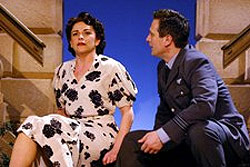
| HOME |
| NERVE |
| REVIEWS |
| ARCHIVE |
| EVENTS |
| LINKS |
| ABOUT US |
| CONTRIBUTORS |
| BACK ISSUES |
| CONTACT US |
 Much Ado
About Nothing
Much Ado
About Nothing
Written by William Shakespeare, Directed by Phil Wilmott
Liverpool Playhouse (13th
April – 5th May 2007)
Reviewed by Colin Serjent
This is the latest in the many unusual ways that a play by Shakespeare has been adapted. But this version of Much Ado About Nothing left me puzzled and perplexed at times as to what was being enacted in front of me.
Set on VE Day in 1945 in a English country house, there is barely any reference in the production to the traumatic and tragic six years which had led up to that historic day. It transforms Beatrice (Sally Anne Triplett) into a ‘Dig For Victory’ volunteer and her (at first) reluctant lover, Benedick (Simon Merrells) into an officer class toff. The verbal sparring between them - much like lovers do - is true to life, and sometimes comical.
Further humorous moments are provided by Dogberry (Stephen Boswell), a somewhat gormless looking Boy Scout leader, in charge of a troop of mischievous Liverpool-based scouts. They appear to relish being on stage, with even one of them waving to someone in the audience while standing to attention during the play.
But the one who produced the most laughter was Margaret (Ally Holmes), the handmaid and confidant of Hero (Ruth Everett), who commands the stage with a confidence and a flourish.
Unintentional hilarity occurred when, on a couple of occasions, part of the lighting, arranged with the victory bunting, collapsed onto the stage. The sudden disturbance caused Leonato (Peter Bygott) to falter mid-speech at one point.
But it was that sort of production - the accident with the lighting did not matter. All too often Shakespeare comes across as dry, kings and queens, difficult text, et al. But this presentation of his work - however flawed - had a user-friendly (sorry about the jargon) feel about it.
Comments:
Comment left by Ed on 21st November, 2007 at 16:52
I felt the production suffered a little due to being made 'accessible'. In my opinion, the best way to make Shakespeare accessible is to make the production clear. There were some great performances, but overall it felt unnecessarily dumbed-down. On reading the program, there seemd to be a clue: the director stated that his first decision was after which war the play should be set. Surely the first decisions have to be about what the play MEANS, and which themes to highlight to demonstrate it's relevance.